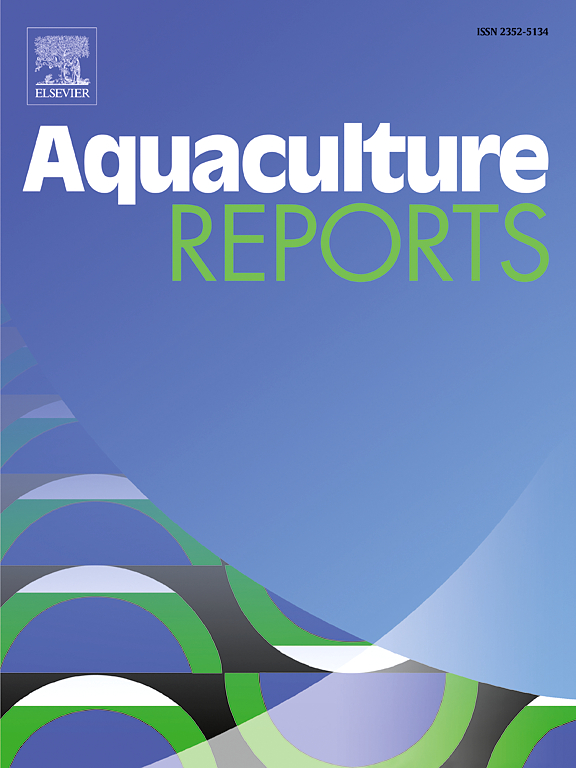急性温度胁迫对单结核Stichopus monotuberculatus行为、呼吸代谢、组织结构和氧化应激的影响
IF 3.7
2区 农林科学
Q1 FISHERIES
引用次数: 0
摘要
本研究旨在探讨急性温度胁迫对单结核Stichopus monotuberculatus的行为、代谢变化、组织结构和酶活性的影响。选取体重为3.6 ± 1.12 g的单结核菌进行急性温度胁迫实验,分析单结核菌对急性温度胁迫的生理反应。结果表明,在极端温度胁迫下,单结核葡萄球菌的活性和粘附性显著降低。高温应激导致呼吸代谢增加。低温胁迫的主要适应策略包括通过蛋白质代谢获得额外的能量。急性温度应激还对呼吸和消化组织造成结构性损伤,以15℃和35℃组恶化最为严重。高温组的氧化应激指标(CAT、AKP、MDA)均高于低温组和对照组。本研究从宏观层面报道了单瘤葡萄球菌对温度胁迫的响应,为揭示单瘤葡萄球菌的耐温机制提供了宏观数据,丰富了该物种的生物学理论,对单瘤葡萄球菌的养殖温度管理具有重要的指导意义。本文章由计算机程序翻译,如有差异,请以英文原文为准。
Impact of acute temperature stress on the behavior, respiratory metabolism, tissue structure, and oxidative stress of Stichopus monotuberculatus
This study aims to explore the impact of acute temperature stresses on Stichopus monotuberculatus, focusing on behaviors, metabolic changes, tissue structures, and the activities of enzymes. S. monotuberculatus weighing 3.6 ± 1.12 g were selected to conduct acute temperature stress experiments and analyzed the physiological response of S. monotuberculatus to acute temperature stress. The results indicate that under extreme temperature stress, S. monotuberculatus exhibits significant reductions in activity and adhesion. High temperature stress led to an increase in respiratory metabolism. The main adaptive strategy to low temperature stress involved obtaining additional energy through protein metabolism. Acute temperature stress also caused structural damage to respiratory and digestive tissues, with the most severe deterioration observed in the 15 ℃ and 35 ℃ groups. The oxidative stress indicators (CAT, AKP and MDA) in the high-temperature groups was higher than that in the low-temperature groups and the control group. This study reported the response of S. monotuberculatus to temperature stress at the macroscopic level, providing macroscopic data for revealing its temperature tolerance mechanism, enriching the biological theory of this species, and having important guiding significance for temperature management in S. monotuberculatus aquaculture.
求助全文
通过发布文献求助,成功后即可免费获取论文全文。
去求助
来源期刊

Aquaculture Reports
Agricultural and Biological Sciences-Animal Science and Zoology
CiteScore
5.90
自引率
8.10%
发文量
469
审稿时长
77 days
期刊介绍:
Aquaculture Reports will publish original research papers and reviews documenting outstanding science with a regional context and focus, answering the need for high quality information on novel species, systems and regions in emerging areas of aquaculture research and development, such as integrated multi-trophic aquaculture, urban aquaculture, ornamental, unfed aquaculture, offshore aquaculture and others. Papers having industry research as priority and encompassing product development research or current industry practice are encouraged.
 求助内容:
求助内容: 应助结果提醒方式:
应助结果提醒方式:


